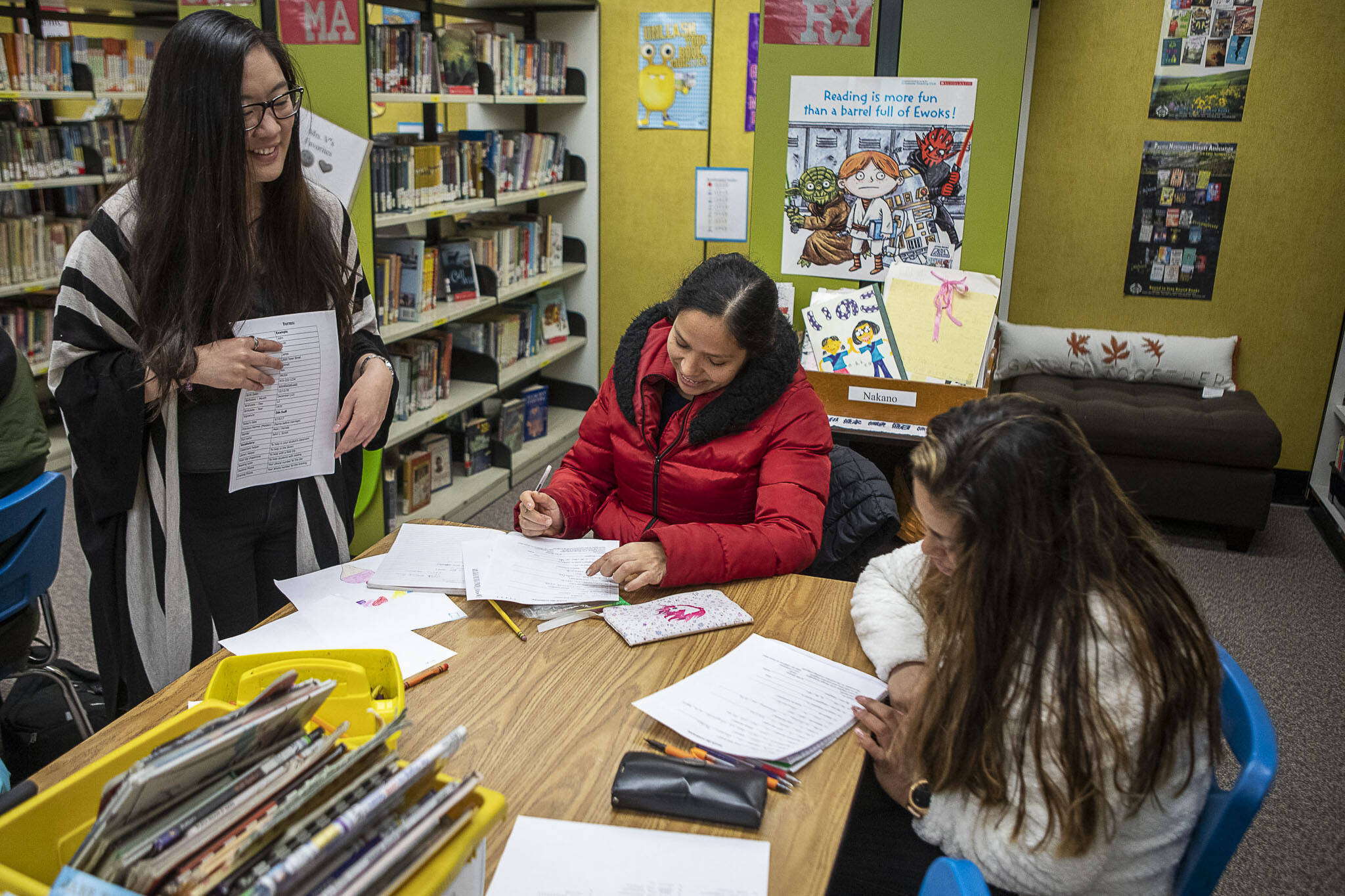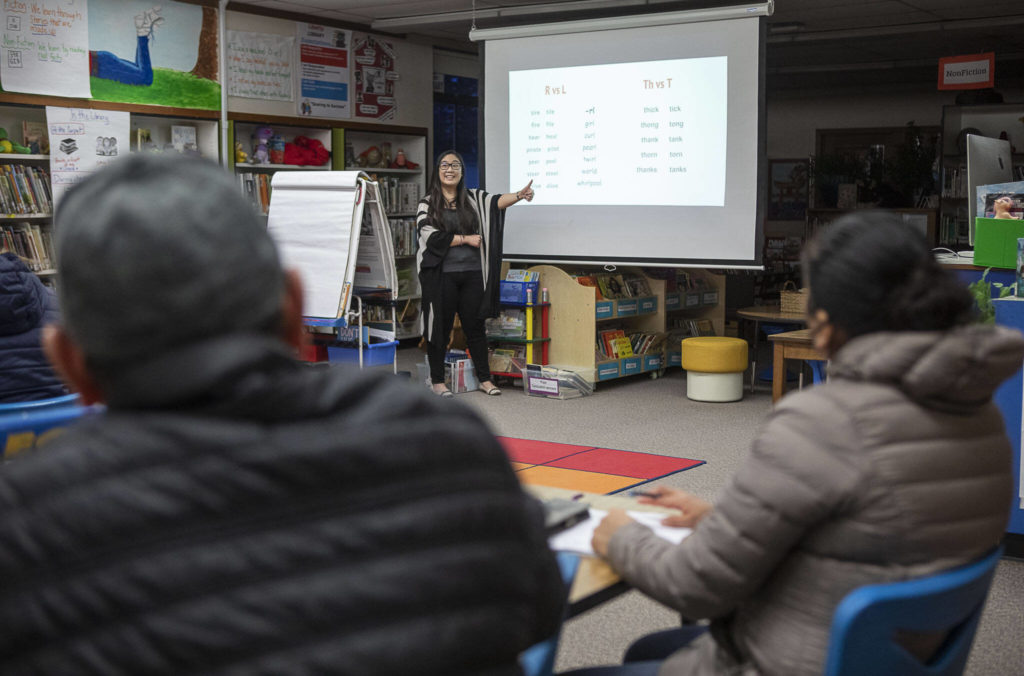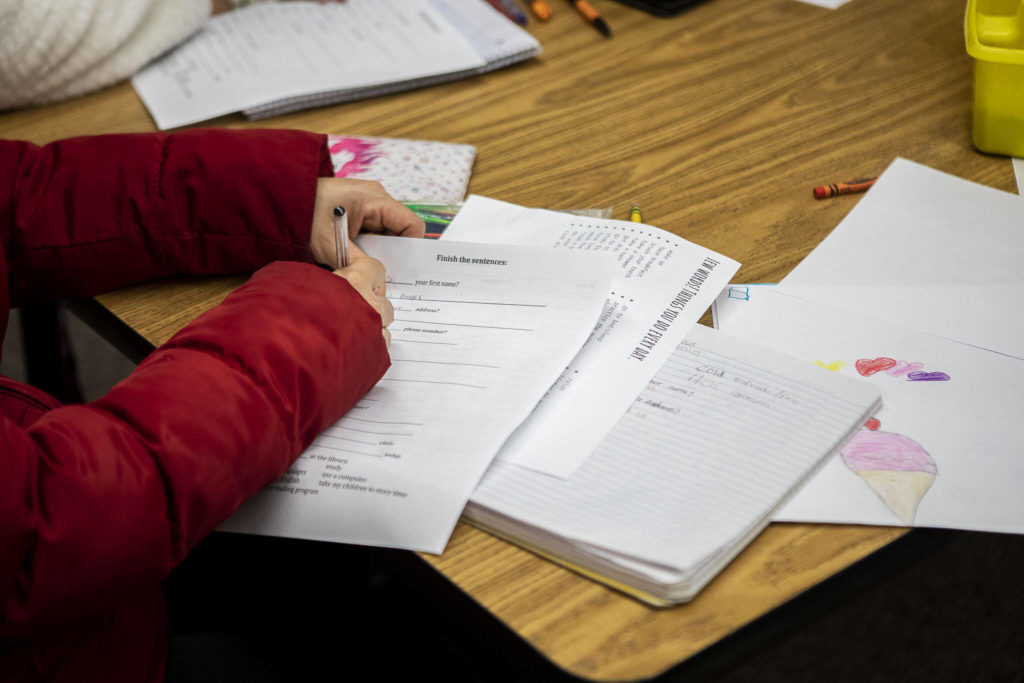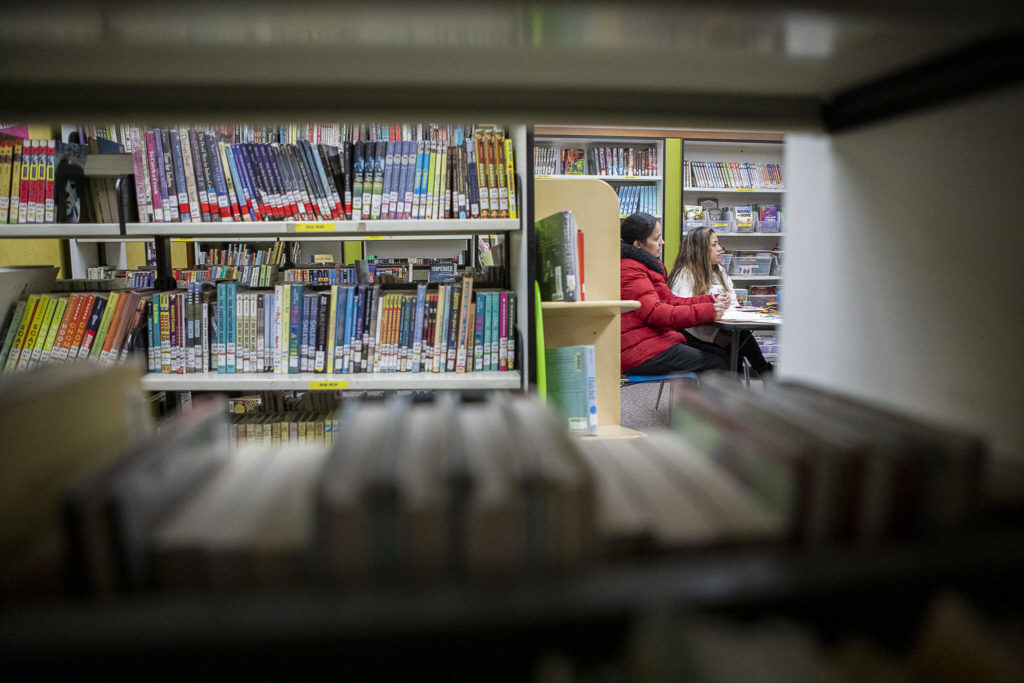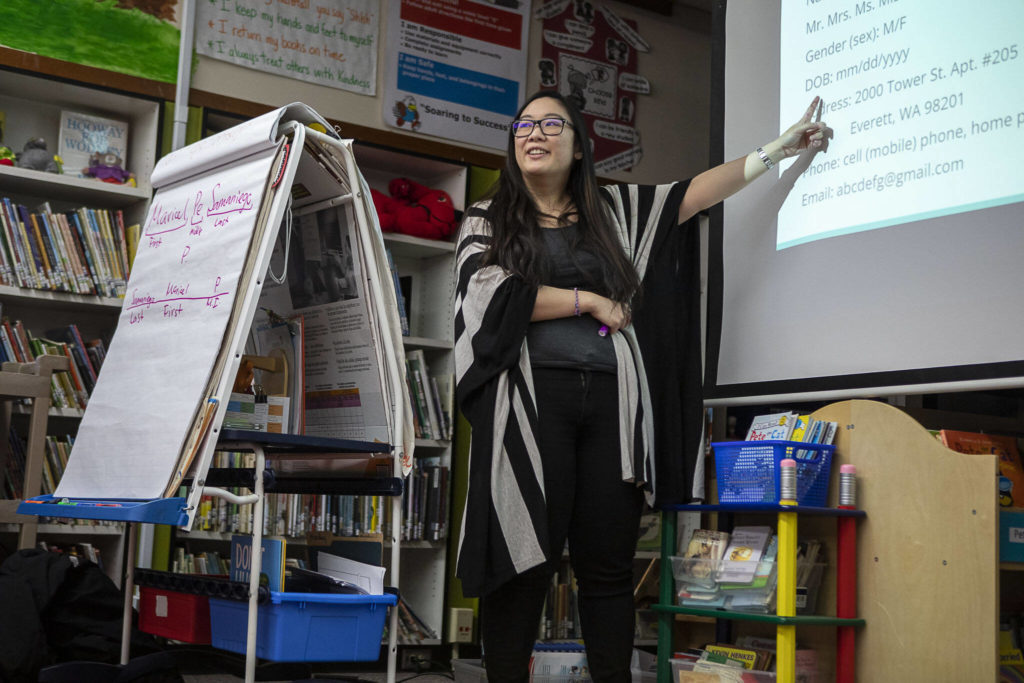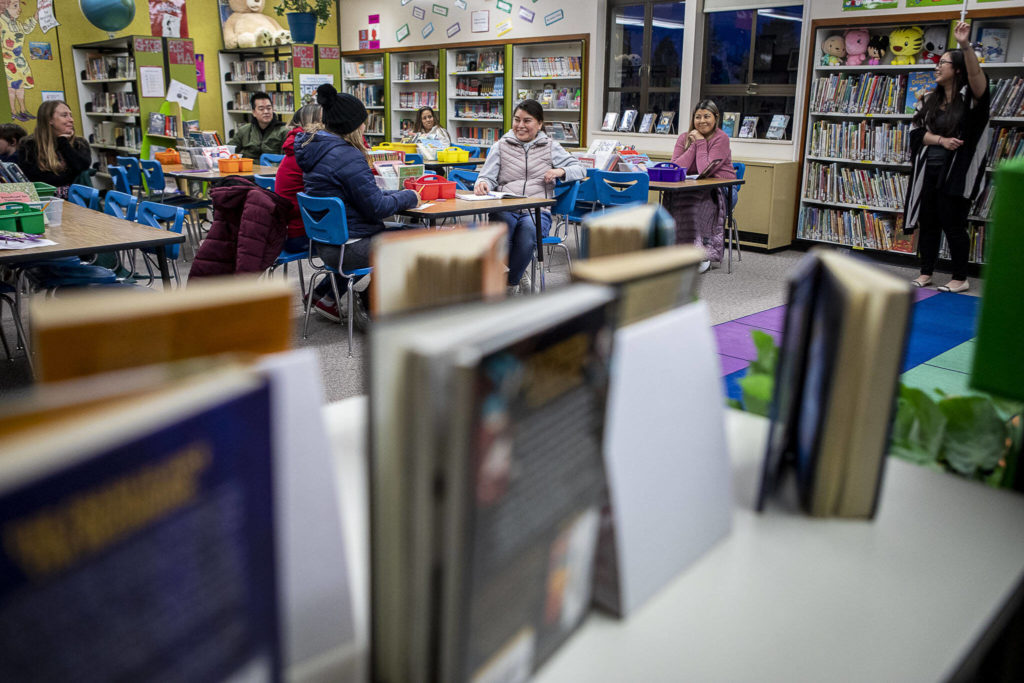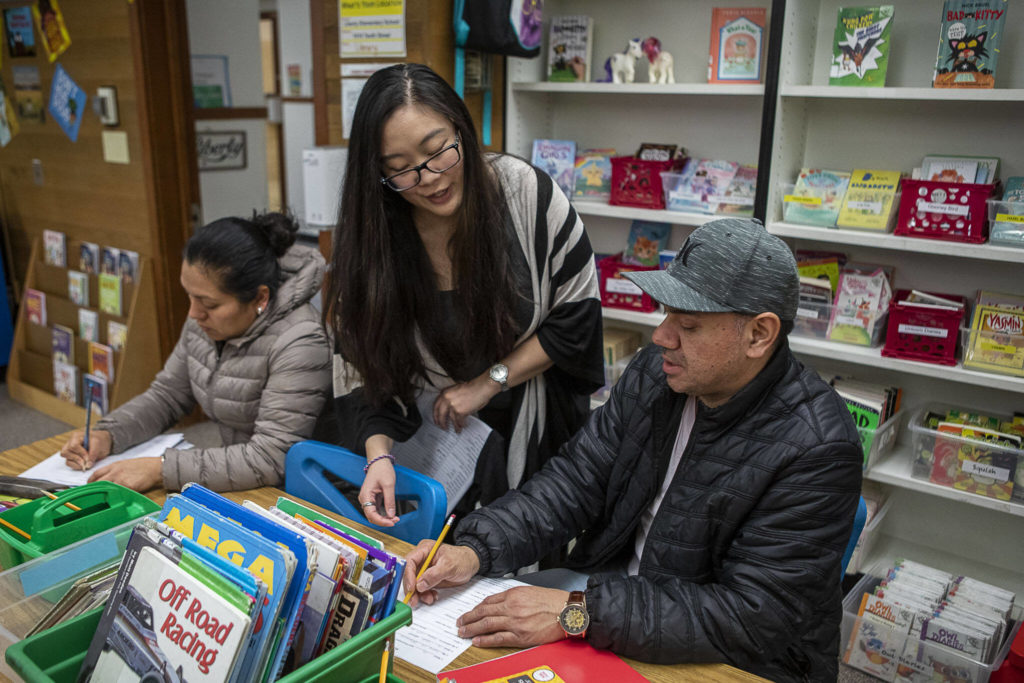MARYSVILLE — A call-and-response of tongue twisters chorused in the Liberty Elementary School library on Monday evening.
“I know some of you don’t like me because of this,” Maricel Samaniego joked as she led about a dozen parents practicing short sentences packed with r’s, l’s and th’s enough to challenge the articulation of even a fluent speaker.
“The girl with the curls twirls around the world,” Samaniego said.
“The girl. With curls. Twirls. Around the world,” the class chimed back slowly.
“Try it faster,” Samaniego said, and one of the adult students let out a quiet but lighthearted “ugh.”
The class, offered free of charge for families in the Marysville School District, helps parents learn the language their children speak at school. It also provides practical advice for navigating paperwork, parent-teacher conferences and their own post-secondary education in an unfamiliar country.
Those benefits help boost parents’ confidence, engage more in their child’s education and improve outcomes for their families, said Chayuda Overby, director of the Everett Community College BRIDGES Center that runs the class.
“(It) plays a critical role in aspiration, access, achievement and engagement for its community in Marysville,” Overby said. “Those dimensions help families create not just hope but provide a sense of belonging as a community, and (helps them) emerge into an important role as engaged parents and citizens of our society.”
Marysville School District contracts with EvCC to host the class. The district funds the course using federal grants designated for programs that benefit students and families who speak English as a second language. It costs about $7,000 per quarter; this year the district paid for three quarters.
Marysville also provides the “classroom” in the Liberty library, so it’s nearer to local parents.
EvCC provides the staff and curriculum from its “transitional studies” program that helps students prepare for college-level courses with English classes, GED programs, tutoring and basic skills training programs.
“Our hope is that they continue their studies and eventually move on to Everett Community College after this class,” Samaniego said.
When students see their parents go to school, they usually engage more in their own learning, Liberty Principal Travis Hammond said. The English class also helps those parents feel more comfortable in their children’s school, he said.
“Many of these parents, the only time they come into the school is if their child is in trouble,” said Hammond, who is fluent in Spanish. “But now they are coming into the building for their own classes, so they have a sense of, ‘Hey, this is my building, too.’”
When they feel comfortable, parents are more likely to get involved in their child’s education, said Chris Pearson, executive director of teaching and learning in Marysville. That includes volunteering in classes, joining a PTA board or simply meeting with teachers.
Most parents want to be involved, Pearson said, but language can be a barrier. If they aren’t fluent in English, a parent might be nervous or hesitant to talk to educators.
“Our Hispanic population in the district has increased the most out of any group, so we want to do everything we can to help them feel comfortable here with our schools and with our community,” Pearson said. “This is a really nice way to do that.”
Andrea Gomez, whose son attends fifth grade at Allen Creek Elementary School, said she has taken the course three times. After this quarter, she’ll sign up for a test to get her GED.
Using Hammond as a translator, Gomez told The Daily Herald that she’s taking the class because “I have to learn English.”
Gomez’s son speaks in English most of the time, so the classes also help her talk to him — and practice her English — while at home, she said.
As she learns, she’s able to understand her son’s teachers in meetings. She said she feels more comfortable visiting his school to see how he’s doing in class.
EvCC partners with Arlington and Lake Stevens to run similar programs, but Marysville was its original partner, Overby said. The district has offered the class for almost five years, including some online courses during the pandemic.
Enough parents want to take the class that the district now hosts it three quarters per year, with 25 spots each, Pearson said. There’s also a waiting list.
Most of the parents in class speak Spanish, but Samaniego has also worked with parents fluent in Vietnamese and Korean.
On Monday, Samaniego led an activity where each parent filled out an information form asking for name, birth date, address and other basic information.
That may seem like an easy task, but cultural differences can complicate things. For example, many other countries write dates as day, month then year, while the U.S. standard puts the month first.
Nemecio Rios, a student in the class, said he didn’t know that when he signed up for his first U.S. ID card after moving from Mexico. His birthday is April 9, he said, but on the license form he wrote it with the day first, so it appeared on the ID card as Sept. 4.
He eventually got it changed, but it was a lengthy process that required a birth certificate and more paperwork. Practical lessons like the ones he gets at Liberty can help parents like him avoid similar headaches, he said.
And schools use lots of forms. So the more practice parents get, the easier it is to complete attendance paperwork or sign up for school programs, Hammond said.
“Last week, I told my daughter that I want to try to speak English always,” Rios said. “You know why? Because I need to practice.”
Mallory Gruben is a Report for America corps member who writes about education for The Daily Herald.
Mallory Gruben: 425-339-3035; mallory.gruben@heraldnet.com; Twitter: @MalloryGruben.
Talk to us
> Give us your news tips.
> Send us a letter to the editor.
> More Herald contact information.
